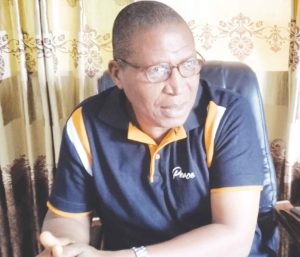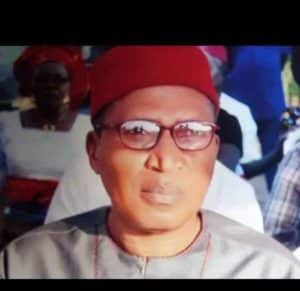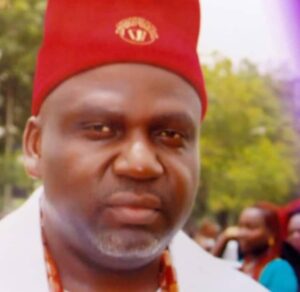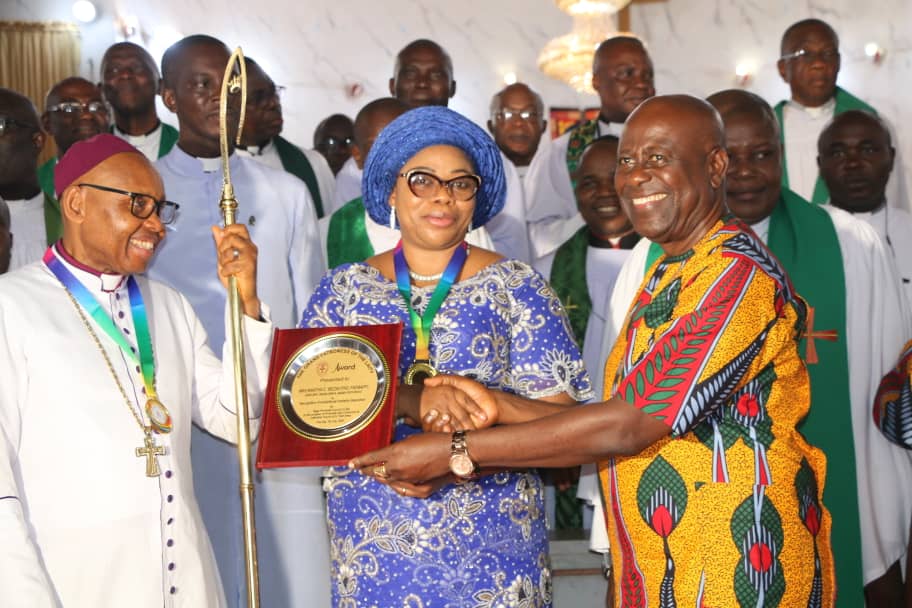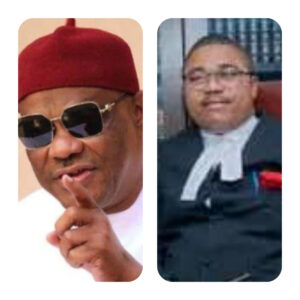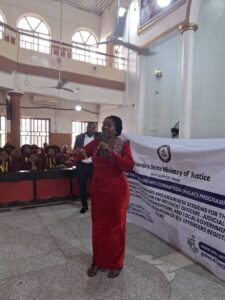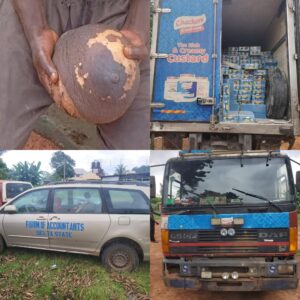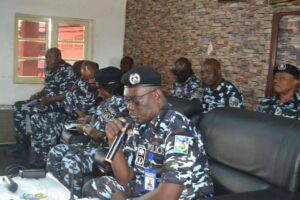The Major Issues That Led To Biafra War Have Not Been Fully Addressed – Amobi Adrika
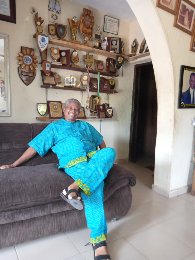
Prince Amobi Adrika is a retired managing director of the Anambra State Broadcasting Services (ABS) and the Ichie in charge of media and publicity in the Ojoto Igwe-in-council. The one-time president general of the Ojoto town union and current chairman, board of the parent company of Blaze FM, Oraifite and Kiss FM in Lagos & Abuja. He is a Rotarian and currently the Assistant District Governor for District 1940. In this interview with ADA NWANAGUM, Adrika said that the major issues that led to the Nigeria- Biafra war has not been fully addressed. He also reveald how he survived the war, the numerous challenges and burning issues including the continued agitation for secession so long after the war.
Can you recall where you were and how you found out that there had been an outbreak of war between Nigeria and Biafra?
You see, we had this first problem, the pogrom, the massive killing of the Easterners such that many of them ran back home in the East. I was then at a place called Canty Grammar School, Ikwerre-Etche in present Rivers state. I was a student there when the military governor of Eastern Region, Lt. Col. Chukwuemeka Odumegwu-Ojukwu came to address us the students at Isiokpo. Soon after this address, the school authorities asked us to go home as the situation (in the relationship between the east regional and federal governments arising from the killing of easterners in the north) couldn’t be contained.
What was your young mind’s response to that situation?
Although I was much younger, I tried joining the Biafran army then in Port-Harcourt. We went to a place called Bernard Carr Field where the recruitment exercise usually held but it didn’t work out because I was considered under age. When that didn’t work, I joined the Civil Defence and worked as a fuel attendant at a fuel station. This was because I wanted to be useful to the Biafran cause. I worked there until when Port-Harcourt fell to the federal troops. My family had to flee Por-Harcourt to my home town in Ojoto, in Idemili South local government area of Anambra state. After staying idle at home for a while, I engaged in some little buying and selling just to help augment my needs as a teenager, it got too boring and so I joined the Biafran army at Nnewi, even without my father’s knowledge. It was after the training that my father got to know about my involvement and he influenced my posting to my home town Ojoto which hosted the Biafra 54 Brigade. I was there as a clerk handling what the military refers to as Sit-Rep (Situation Reports). That was until one of our officers from Nimo called Captain Acholo was made commander of the newly created 78 Battalion. Two other boys and I were deployed to the new unit and had to live with him at Umuoji. I remember that we were labelled ‘Acholo boys’. From there, he was made Brigade Major and we moved with him to Nnobi from where we used to go to the war front. However, I had some protection, being one of his batsmen, although I saw the warfront action very well. I tell you, it was not a good experience.
Can you share with us, your initial reactions to the hostilities and how you eventually ended up in the war front?
You see, the Igbo (Biafrans) weren’t treated well and that was in reaction to this that I was driven to join the Biafran army. You kill a people and, after that, you don’t want to let them go. What then is the essence? The Igbo were saying “let us go since you don’t want us” but they said “No, you must stay with us”. Then, give us some fairness or fair share of what is entails, you still don’t want to. That was the situation. You see, I don’t regret any moment of my being a soldier in Biafra. Not at all. I do not blame some of these young men that are clamouring for Biafra, even though I know that some of them do not understand what is involved in a war. The truth is, we are being maltreated; we are not having our fair share. Look at what is happening right now with the coronavirus palliatives donations being distributed. A lot of money are coming from Igboland but when they want to share it, they will devise a means to cheat the Igboland.
Where exactly did you taste your first frontline battle and how did you survive?
The first time I went to war, it was a funny thing. I went for this deployment with one sergeant major. We were on an assignment and then heard this gunshot. It was, actually, an airburst. I was so scared that I made to take cover (lie down) but the sergeant shouted at me to get up and ended up calling me an idle civilian, a derogatory appellation for non-soldiers. After two or three attempts, I appeared to get used to it. This happened at the Ogidi sector around the Iyienu Hospital where we actually had a battalion command post. It was at one Balonwu’s house near that axis. That was where I had my first taste of the warfront.
Can you recall some of the most daring and deadly battles you fought and where?
You see, I was in army for barely nine (9) months, during the first few of which I was a clerk in the office handling sit-rep. Then, I was made a lance corporal after ‘operation do or die’, when we opened the Otuocha corridor. Some of us from different sectors and who were part of the operation were promoted as well. I once took ill and wrote for permission to travel home for treatment. After reading my letter, our brigade commander inquired to know the class I was in before the war. When I told him that I was in form four (4) in the secondary school, he said that I was due for being commissioning as an officer. He set the action in motion but by the time the signal came for me to go for commissioning, the war ended. So, I remember that ‘operation do or die’ which enabled Biafra to recover many things from the federal troops. These included food items that lasted us for a long time.
Can you recall some of the comrades you lost on the frontline and how they fell?
The one that pains me a lot was one Obi Ukwu from Nnewi. You see, I had known him as a young boy although he was two or three years ahead of us. Things were so tough when he was commissioned, I had to lend him one of my uniforms. He died in that uniform at the front 2nd Lieutenant. Whenever I recall those who fell, I remember him, as well as one of his cousins, Ifeanyi, also from Nnewi who fell quite early in the war. He was an only son of the mother and was killed by a sniper. That was very devastating and I couldn’t imagine how the mother would feel. I went to see her when the war ended but she was no longer the woman I used to know. Those were the people that I was close though there were other losses too, one of them being my brother’s friend whose head was chopped off by the federal troops in Port-Harcourt. That was one of the things that triggered our decision to fight back through joining the Biafran army.
it was known that Biafran soldiers had tremendous setbacks during the war. What such challenges did you personally encounter while fighting for the new nation?
When we talk about challenges, they come in different forms and categories. We had so many of them, you see. I don’t have to personalise it because it was a group effort. As at when I joined the Biafran army, we were having two meals a day but by the time the war was coming to an end, it was one meal a day except for one of us who was involved in this business called afia attack. He collected some money, crossed over to the enemy side to bought things some of which we sold to make money. So, we fed heavily, at least once a day, aside what we were given and because I was a batsman to an officer, feeding wasn’t actually a problem to me. Another thing you should know is that when you realise that you are going out for an attack that you are not too sure of returning alive to meet the people you left, that alone, is a big challenge. In my own case, each time I look back at the days of war, I always thank God for loving me and keeping me alive till date. By 1st of May I will be celebrating my 71st birthday and I give God all the glory.
What was your greatest motivation during the war?
We had a purpose which was Biafra. We wanted freedom; we wanted this Biafra with all honesty since the other people in Nigeria did not want us, even in the Biafran land. We felt there was no point staying in Nigeria where we were not wanted? Let us go. Incidentally, they didn’t want us to go and now some of us are realising what we were shouting about then and it is still happening. But I pray for Nigeria to survive.
There were allegations that both Nigeria and Biafran soldiers were brutal to civilians on the Biafra side at the height of the war. Did you witness any of such incidents?
No, I wouldn’t say I witnessed anything like that at the height of the war but, you see, what went for Mr. A might not have gone for Mr. B, so, it’s neither here nor there and, besides, everybody is not of the same make-up. I remembered during the war, I think 25th or 30th December, 1969 in a place called Nimo, everybody was moving around very freely, including the soldiers who appeared to give the impression that they were tired of the war and tired of killing themselves. After the Christmas celebration, however, the hostilities resumed. Of course, we are all human beings, with this conscience that often taunts us, asking us why we have to continue killing our fellow human beings on the orders of those in the top ranks, of course tuck their children away to safer climes.
Can you recall where you were and how you felt when the news broke that the war had ended?
I was in a camp at Nnobi. As a matter of fact, I was there when Ojukwu’s caravan left for Uga airport via Nnobi. He was said to be going out of Biafra in search of peace although we knew the war was coming to an end. So, when General Philip Effiong made that broadcast, we knew the die was cast and it was only a silly person who would continue fighting. Naturally, I felt good when the war ended because the hostilities got subdued. Also, I had missed school for three years and I had wanted to go back to school by all means. As I could not return to my school in Ikwere-Etche, I enrolled at Merchant of Light, Oba to resume my education after the war.
What was your rank in the Biafran army when the war ended and how did the Nigerian Government treat people like you afterwards?
Like I said before, I ended the war as a lance corporal. After ‘Operation do or die’ I was promoted to lance corporal. But I never joined the Nigerian army afterwards because I had to go back to school. I give it to General Yakubu Gowon because a lot of us enjoyed scholarships such that, after my first year in the university, I didn’t pay any other fees for the remaining three years. It was that way for a couple of years after the war ended as most students enjoyed scholarships, bursaries from the federal government.
Almost 50 years after the war, do you think the Nigerian government has addressed the issues that led to it?
You know, for the ordinary Nigerian, he may not see anything wrong with the Igbo man and his wants. Whatever you do as an Igbo man, you are looked upon as a cheat or a ritualist. But in Nigeria we know who are the real ritualists. It’s not that I am exonerating all the Igbo in the game. I mean, there are particular sections in Nigeria where robbery started; where ritual activities started; we know them. But now, everything that happens, it is the Igbo man. There is this Igbo phobia even on social media. There is this man that likes condemning the Igbo on Facebook but he is now changing his dancing steps after seeing what is currently happening in Nigeria. So, everybody is now listening and understanding what the Igbo have been saying. The Igbo don’t want to cheat you; the Igbo just want to stay on their own. An Igbo man works hard to get to where he is or wants to be and that I see as the only problem people see with the Igbo man. This is purely out of such people’s laziness, especially their men. Till date, I don’t think the issues that led to the war have been fully addressed in Nigeria. Anybody who says those issues have been addressed must be deceiving himself or herself. You see, if Nigerians say they want the Igbo, then, let there be fairness in all sectors of the country’s economy. Imagine where cut-of marks for admission into federal government academic institutions for some states will be less than 30, candidates of Igbo origin must score over 250 for the same admission, in the same Nigeria. When they want to share amenities, those same favoured candidates still get the better part of the share. Is it fair enough? No! So, let there be fairness and Nigeria will be one. If there is a fairness in all sectors, the Igbo will not bother and the clamour for Biafra will be subdued.
As someone who lived through such a terrible period, would you subscribe to the current clamour for secession of South East from Nigeria as Biafra state?
You see, that is what I am saying; if the rest of Nigeria feels that the Igbo are not wanted, let them allow them to go. However, if they feel that the Igbo are welcome and go ahead to give them the things every other section gets, then we can live as one Nigeria. The slogan then was, “to keep Nigeria one is a task that must be done”. So, if it is a task, how do you keep Nigeria one? To me, if Mr A has what Mr. B has and they are both treated the same way, there wouldn’t be any problem at all. There shouldn’t be any sacred cows in any relationship otherwise that relationship will fail. I am pleading for caution. It not everybody in Nigeria that is maltreating the Igbo. There are good Nigerians who would want the Igbo to have fair treatment in the polity. Let our agitating young men look for such people, work with them and see if Nigeria will work. If, then, it doesn’t work, who am I to say the Igbo must be in a place and have their head bruised? So, I am just pleading for caution; that’s all.
How would you describe or rate the man Ojukwu, the fore-bearer of the Biafran war?
You see, Dim Chukwuemeka Ojukwu was an enigma. He is somebody that when you listened to him speak, it would be very difficult for you not to harken to his words or what he is calling for. I guess, he was a careful man. He was 33 years old when he started leading Biafra. He was focused, educated and had a lot of sense inside him. He was cautious in carrying his people along with him, except that he experienced betrayals even amongst them. You see, until tomorrow, or till I die, Ojukwu still remains my hero! Whatever he did, aside his love for his people, has nothing to do with my perceptions of him as a man. He lived his life as a human being but for his people, he gave his love, his father’s wealth and almost gave his life. What else would you expect from a hero.
Source: Orient Newspaper


